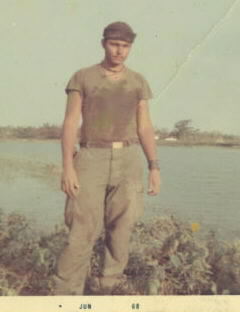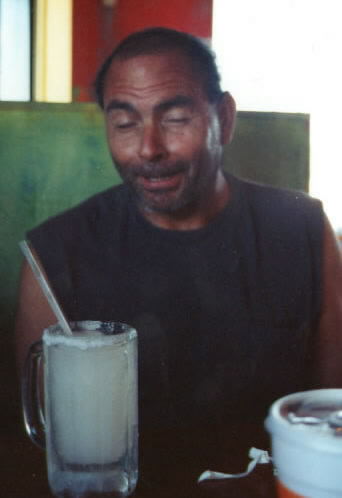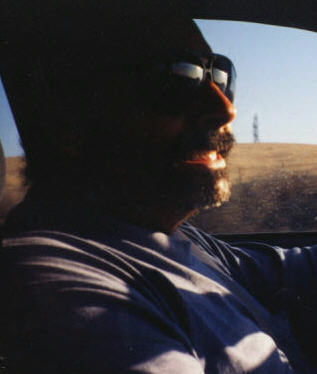Simon C. Ledezma




My father is one of the greatest men that I know. He used to be a Security Guard for the South San Antonio Independent School District. Then when he wasn't able to work there anymore he became a janitor at West Campus High and South San Antonio High. He also did construction. He was even one of the guys who helped build the Golden Gate Bridge. I think that construction was his favorite. Now, he is on disability. Let me tell you the story so you can understand who he is. One day when he was working on the roof he picked up some plywood and the wind caught him so he fell down. He landed hard and broke both his legs. Despite this, he didn't want to leave his tools out for people to take, so he drove his truck home and then called the ambulance. He found out that he had broken one leg and shattered his ankle. So now, he is on disability.
I interviewed him on his experiences in the Vietnam War. I had heard stories
about him in the war, like how he was Sergeant for the 1st Air Calvary Unit 5th Division, or
how he saw some of his friends get killed and how he received medals but never
went to pick the rest up because he just wanted to get away from it all. He told
my mom that he didn't want any reminders, but he and I have
never talked about
him in the war, until now. The first words out of my father's mouth
when I mentioned Vietnam were, "nonsense war." I had heard
this before, but didn't know what it meant, so I asked my father what he
meant, and all he said was that "The war made no sense."
He is 54 years old now, but when he was 19 and just out of high school his dad took him to sign up for the draft. He is a part of history, and I am glad he shared it with me. Now, I will share it with you...
How did you end up in the Vietnam war?
My father took me to sign up for the draft. That day, some people
from the government took all the draftees out for a steak dinner. From
there they put us on a truck and we were on our way. I never had the
chance to tell my family goodbye. I remember calling my father when we got
there and he asked me if it was time to pick me up and all I could say was
"No, I'm already at the war."
What did you know about Vietnam before going there?
Nothing. Just that it was a war over there. It wasn't like now that we fire
one bullet over there, fire one shot and everybody knows about it. It wasn't
like that. They had those people protesting, but I didn't really pay
attention to it.
Did you take any personal belongings with you?
Not really, just a camera. I got some pictures, but I don't know where
they are right now.
What did you do when you first arrived?
First we went into Basic Training, that is where we lerned how to march
and how to handle a rifle. And then we went to AIT, that is Advanced Infantry
Training.
What did you do there at AIT?
We learned about the weapons and how to do hand-to-hand combat.
Where were you stationed for training?
For both basics and AIT, at
Fort Polk, Louisiana.
Did you know anyone there, have friends who went with you?
Not friends from here, but they were all mostly from San Antonio. They
just took a whole bunch and took them all over there. There was about 40 of us
from San Antonio.
Did you make a lot of friends there?
No, I just mostly hung out with three guys. Just Jesse, me and him were
mostly together.
Did you ever write home to your mom?
Once. Maybe once a month, just to say I was doing okay.
What was your job in the war?
Machine gunner. I had the machine gun, M60.
The one that Rambo had with the belts of bullets.
I carred it on my shoulder. I carried the bullets in a little pack so they wouldn't get wet
or muddy because then they wouldn't work. Some guys did connect them like him, but there was
no Rambo here.
How many people were there to a squad?
The squad had seven or eight men, and there were five squads in one platoon.
One time only me and another guy were left. Out of 40 men, some were on R&R, the others were dead
and there were just us two left for about a week.
In Vietnam, where did you sleep? Was it like the movies?
For training we had bunks, but in 'Nam we slept anywhere we were. In
the woods or in the jungle, we just slept on the ground. There were a lot
of bugs and mosquitos. We wore repellant to keep them off. The repellant
in the army worked good.
Did you sleep good?
I always slept in a deep sleep. Not really alert. But they would wake you
up to do guarding. There was about four or five guys together and you wake
somebody up.
Did you get up?
Yup, but one time I didn't. One time they woke me up, but I didn't know
because I was all sleepy you know, but they woke me up and I said, "Oh, yeah."
and went back to sleep. And in the morning I woke up and everybody was asleep.
They told me, "Well, I woke you up." And I said, "No, you didn't."
How did you spend your time there?
Moving from place to place, always marching. Once we would wake up, we
would start moving.
And you had to carry all of that stuff?
You just carried you food and if you had a poncho, and your ammunition and
rifle and that's it. But not like you see in the movies with the real big
backpacks. Some people carried bigger things, but I never carried anything
like that. Mostly in the evenings the helicopters would bring food. Around
six. So you really didn't have to carry much. They also carried cigarettes.
Did you smoke?
Yeah, a little, but I carried them mostly to sell. A dollar a cigarette.
Especially to those that smoked a lot. They would run out of cigarettes and
I would sell them.
How did you deal with the war?
I just tried to stay out of the way of the bullets.
What about the other guys?
Some of them couldn't handle it, they lost it, not crazy, but sort of.
Did you see your friends get hurt?
Friends? Friends no, but people around me. Dead people. There was this guy,
we were on a hill and there was a helicopter coming down and he couldn't land cause it
was slanted and the blades were turning and he ran right into them. It cut the top
off his head. The top of his helmet off and the top of his brain. He died right there.
Just thinking about it I remember, but most of the time I don't think about it.
There was this one guy when we were in a trench he got shot through his chin, it
came out the bottom of his mouth and went into his throat and out the back.
All this blood started coming out. I was the only one there with him. Me and him were
the only ones in the front. Everyone else had pulled back and we were left there.
They were shooting and we couldn't get out. We couldn't go up on top. Then they
brought in the jets and started dropping bombs. And they were only like across the
street, that close. The whole place was shaking and moving because we were
on the sand. After the guy died, one of the platoon leaders came over and he told
me to follow him because he had found a way out. So we just left the guy there
and we went back to where the rest of the people were.
Did you feel guilty because you lived?
No, it just wasn't my time. One time they were shooting mortars,
and I had my little backpack on and I laid down
because they were dropping them and I heard a piece of shrapnel,
It hit me right in the middle of where the straps cross and it didn't hurt.
A mortar is a cylinder cannon that can be moved around and when fired it
sends metal flying everywhere. When it went up it came down on me but didn't
cut my back. I was lucky I guess.
Did you ever fear death?
Just in the last month cause I was at the base camp doing
guard duty at night. But not really afraid, but I was scared of them coming in you know.
Did you recieve any medals?
Yes, I have some but I don't remember what they are. I only have some
of them because I never went to pick up the rest of them.
Have you ever gone to see the Vietnam Memorial Wall?
No, but I want to before I die. I want to see if there is anybody I know
up there.
Did you experience any post tramatic stress syndrome?
When I first came home, I would be outside and when I would hear
a helicopter, my first instinct was to get down on my stomach. But now, with my
hearing not too great, mostly because of the war, I haven't done it lately. There
were a couple of times when I would hear someone walking by trying to be quiet
because I was asleep, I would get up expecting to see a different setting. And recently,
when it was raining, and a loud thunder went off, I woke up startled thinking
"Incoming." It took me a few seconds to remember where I was, but that was
a long time ago.
Is there anything people can learn from your experience?
Nothing. I mean I went and I came back. There's nothing to learn from it
except keep down when they are shooting.
I also saw how uncomfortable my father gets when it comes to remembering the war. I felt bad because he looked like he was going to break down into tears. He is the strongest man that I have ever known, and to see him like this broke my heart.
I am glad that I asked him to do this because I think that it has made us closer. I find that we talk a little bit more than we used to.
I love my father, and he will always be my hero.

